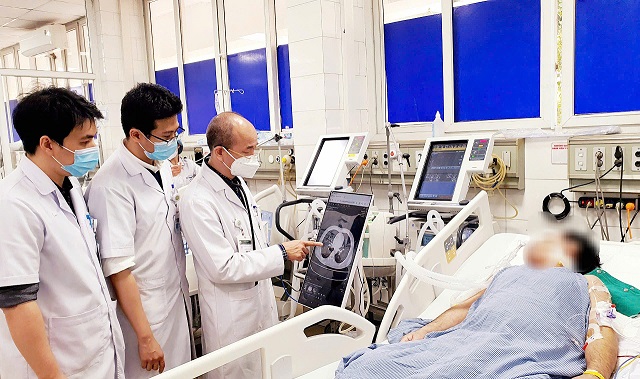Receiving hundreds of measles cases in adults
Associate Professor, Dr. Do Duy Cuong - Director of the Institute of Tropical Medicine - Bach Mai Hospital said: Since the beginning of the year, the hospital has received hundreds of measles cases in adults, an average of 10-20 cases per day. Common symptoms are fever, rash, cough, watery eyes, runny nose.
However, many patients progress severely with complications of pneumonia, respiratory failure, hyperlipidemia, diarrhea, and even encephalitis - meningitis. And most of these cases have not been vaccinated or have been vaccinated before but have not been vaccinated again.
For example, a 51-year-old male patient (in Gia Lam, Hanoi) has a history of diabetes and bronchial asthma. The patient was admitted to the Institute of Tropical Medicine, Bach Mai Hospital with the diagnosis: Measles/dybetes type II - THA - bronchial asthma.
Despite treatment, after 5 days, the patient's difficulty breathing gradually increased, he had to have an endotracheal tube, mechanical ventilation, and arrhythmia with cardiovascular disorders and was at risk of serious complications.
The 28-year-old female patient (in Hai Hau, Nam Dinh) was 8 weeks pregnant and was hospitalized with high fever, chills, muscle pain, and redness from the face extending down to the neck, chest, and abdomen. In addition, the patient had a dry cough, itchy throat, diarrhea with water 4 times/day, no abdominal pain.
The patient self-treated to reduce fever at home, and the condition did not improve. Upon admission, the patient was diagnosed with Bacterial corrupted measles, monitored for pneumonia, and high risk of affecting mother and fetus.
Previously, doctors also treated a 38-year-old male patient (in Phu Thi, Gia Lam, Hanoi) with severe pneumonia, respiratory failure, and complications from measles.
The patient has a history of good health, smoking but no lung disease. The patient's condition progressed rapidly, just one day later, a 39-degree fever appeared, and the body issued a rash from the surface spreading to the hands and body. White phlegm, sore throat and difficulty breathing gradually increase, respiratory failure, severe pneumonia requiring oxygen machines when transferring.
At Bach Mai Hospital, patients with severe respiratory failure must be resuscitated, mechanical ventilation, blood filtration and ECMO.

Do not be subjective in thinking that measles is just a mild disease, it will get better on its own
According to Associate Professor Cuong, measles is a disease with a very high infectious index through the respiratory tract, which can easily broke out in the community if not controlled. Therefore, when a patient is diagnosed with measles, the patient needs to be immediately quarantined for treatment to avoid spreading to other cases.
Measles cases with complications such as upper respiratory tract inflammation, pneumonia, hyperlipidemia, liver failure, multiple organ failure requiring blood filtration, respiratory failure requiring endotracheal Tubes, etc. account for about 5% of hospitalized patients. Cases with underlying diseases such as diabetes and immunodeficiency are at higher risk and easily progress severely, requiring mechanical intervention, said Associate Professor Cuong.
Many people subjectively believe that measles is just a mild disease, and will go away on its own after a few days. However, in reality, the disease can cause dangerous complications if not treated promptly. When there are symptoms of fever, rash, or prolonged cough, it is necessary to go to a medical facility for examination and treatment.
Currently, in Vietnam, measles is on the rise, not only in children but also in adults, especially in groups with underlying diseases or weakened immunity. Measles vaccine is a very safe and effective vaccine, and the Ministry of Health has recommended that all children need to be vaccinated and re-sharked.
Adequate vaccination not only helps protect yourself but also helps control epidemics in the community. Measles is not as simple as many people mistakenly believe, so take the initiative to prevent it before it is too late, said Associate Professor. Dr. Cuong emphasized.
Measles is an infectious disease and can be prevented by vaccination. The measles vaccine is included in the Expanded Immunization Program, vaccinated for children from 9 months, then re-iningue when children are 18 months old or 2 years old.
For adults, when the immune system is weakened, they also need to be vaccinated again. If you have not been vaccinated or do not remember the vaccination history, you should get a second dose of the measles-quai-rubella vaccine (MMR).











